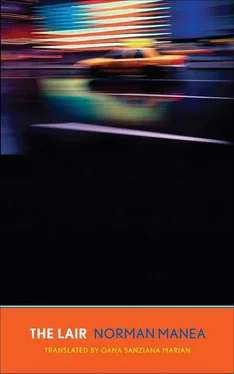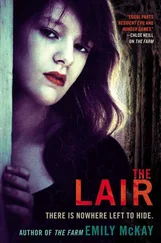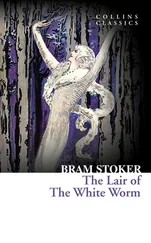Mister Murphy gazed at Mister Ga  par and for the first time smiled. Mister Ga
par and for the first time smiled. Mister Ga  par gazed at the large hands of the interrogator nearby on the table, smiling himself.
par gazed at the large hands of the interrogator nearby on the table, smiling himself.
“I only want to understand. Your fellow countryman dreamed of a better world?”
“All preachers say that. He thought that we lived in a desecrated world. That’s nothing new, nor is it altogether wrong.” “De … what? De-se-cra-ted?”
“A world where there’s nothing sacred. Desecrated. But the sacred is hiding in the profane. That’s what he would say. So then, it’s hiding. . around us, inside us. Whoever is hiding can’t show himself in the light of day. He’s not allowed, he’s in danger, expelled from the light. The sacred is expelled, but hidden, persistent.”
“Why is it hidden? The world is full of churches. And synagogues and mosques. And Buddhist temples. I go to church. I’m a believer.”
“I’m not. I hear that in Los Angeles there are 250 sects. Two hundred and fifty gods? Maybe that’s better than a single god and a religious tyranny. I don’t know exactly what Dima was trying to propose. Ideas aren’t dangerous until they become reality. I don’t think a sanctified world is exactly sacred. I would be afraid of a world like that.”
“The founding fathers of America were people of faith. They read the Bible.”
“But they defined the individual as a citizen.”
“Religion helps man.”
“Maybe. But the state? Iran isn’t the only example.”
“The fact that you were asked to write the review doesn’t mean you had to do it. Was there some kind of revenge?”
“Revenge? Toward whom, and why? I never even knew Dima.”
“It’s not about Dima. People like Dima. Your family has suffered.”
“My family? Yes, they’ve suffered, but I was born after the war. My parents wanted to forget those horrors. And besides, they were deported by the Hungarian administration. Dima isn’t Hungarian.”
“It’s not about Dima, but about people like him.”
Peter is quiet, frowning. His family? So then they know everything about Dima and Palade and about him. Now the police officer will ask for details about the watchmaker who became a Communist prosecutor and the wife he met at the door of the crematorium. He shouldn’t have written the review! He’d foreseen the suspicions. All of his circumspection, allowances, ambiguity, in vain. Just listen to that! Revenge, resentment, rancor.
“No, it had nothing to do with revenge. The review was gentle, the American papers say. They say I was paying homage to Dima. Is that true, I wonder? I’m not immune to the culture that formed me, to its sophistication and affectations. Provincial elitism from the other end of the world. Anyway, Communism cured me of the need to unmask sinners.”
“You said it was nothing new. Then it wasn’t unmasking.”
“Well, yes … I was formed by a culture of ambiguities and copouts. America is reeducating me.”
“Through that female student?”
“Maybe. I hadn’t thought of that. I should have.”
Yes, he should have. Murphy’s suggestion was welcome.
“Students have something to teach me, too, yes. Tara, as well, probably. I am curious; I want to understand the place where I’ve arrived. And you want to understand the place I left behind.”
“In the review, you mention that he was fascinated by tyrants. Did Dima admire tyrants? Why? Didn’t he also live in a tyranny?”
“The military dictatorship was established only after his political engagement. Military, but Balkanic. Not German or Chinese. The advantages of corruption.”
The police officer opens his eyes wide at the praise of corruption, but he doesn’t comment.
“He was to know a Western dictatorship, as well. During the war he was working at an embassy, in a Western, authoritarian state. The “national, unitary, sacred state,” as he used to call it, didn’t bother him. God’s involvement in the administration of society, sacrifice, and decency and Christian redemption, the reintegration of man into the cosmic rhythm, the organic family, all in opposition to degenerate individualism. I read those things here and there, superficially, as I tend to do.”
The theories seemed to be tiring Peter out, as well as Patrick. Ga  par sighed heavily at the final thought, as though after too long a toil.
par sighed heavily at the final thought, as though after too long a toil.
“Was the president of the college hoping to help you gain prestige? He hired you in spite of a lot of opposition.”
“I don’t know that there was so much opposition. Larry — excuse me, President Avakian — was convinced that the review should be written. A just cause, he said. I have to cure myself of my Eastern European equivocation, he said. He’d been a student at the university where the Old Man became a great American professor. The coincidence irritated him.”
“Why did you refuse to be presented as a dissident?”
“I was never imprisoned. I didn’t even demonstrate.”
“You asked to have removed from the college’s guidebook the part in your bio where you’re described as a Holocaust survivor.”
“I was born after all that; I’m not a survivor. In my family, the use of that word was forbidden.”
“Why?”
“Humility. A friend of my father’s who came back from Auschwitz asked a doctor to remove from his arm the piece of skin that had his prisoner number. It was the first thing he did when he came back! He never again mentioned those years.”
“You made anti-Semitic comments at Club 84, at the first job you held in America.”
“The owners were wealthy Jews. I protested to their arrogance, not their Jewishness. The arrogance of wealth. They were throwing away massive quantities of food. I came from a country that was starving. I would have protested to a Chinese club, as well.”
“But in the end, why did you really write the article? That review.”
Peter is quiet. Not to find the appropriate response, but in order to look the interrogator directly in the eyes.
“I had a long conversation with Professor Palade before he was assassinated. Neither of us suspected what was about to happen. I went specifically to see him, to talk to him. He was an expert on the subject.”
“Did you know him? Were you friends?”
“A mutual friend made the acquaintance. Palade felt he was in danger, but I didn’t give it too much attention. I was obsessed with my review. I wanted information, advice.”
“And did he advise you?”
“The Old Man had been his mentor. He’d helped him come to America. He adored him. He knew all of his work and his life. He was the one who asked me to write the article.”
“Why?”
“After the Old Man’s death, a lot of old secrets were uncovered. Palade found himself implicated, without wanting to be. He began writing against nationalism in the exile journals. Violent. Incendiary. He’d discovered motes on the sun. His sun. He was suffering. The pieces he wrote were an announcement, perhaps, of a reevaluation of the Maestro. I’m not sure. In any event, they cost him his life.”
“Was he afraid?”
“I don’t know. He was an odd fellow. Obsessed by mental constructs. Presentiments, parapsychology, esoteric codes. I wasn’t. . I’m no good at these things. I’m blocked. I didn’t pay attention. Afraid, yes, I think he was afraid.”
“Was the meeting useful?”
“It was decisive.”
“Did he tell you things you didn’t know?”
“ Tour text will resurrect the Old Man,’ he said. ‘Even if as the result of a thrashing, he will live again. His postmortem prestige couldn’t be damaged any more than he damaged it himself when he was living,’ Palade said; ‘the reaction to the text will reveal the paltriness of his admirers, that’s all. The posthumous paltriness. The paltriness of sanctification.’ That public lynching was reserved for me, but Palade didn’t talk about this.”
Читать дальше

 par and for the first time smiled. Mister Ga
par and for the first time smiled. Mister Ga 










